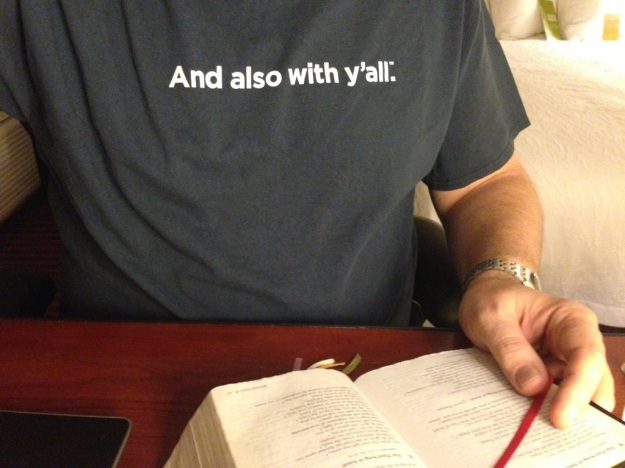
Communion of Saints by Elise Ritter
Whatever your task, put yourselves into it, as done for the Lord and not for your masters, since you know that from the Lord you will receive the inheritance as your reward; you serve the Lord Christ (Colossians 3:23-24).
In a blog post from about a year ago, Rachel Held Evans, author of A Year of Biblical Womanhood, began a conversation on the Greco-Roman “household codes” reflected (and redirected) in several New Testament letters as well as in the passage from Colossians we read this morning.
One of the very interesting tensions in the Christian life is trying to decide what kind of a household we actually belong to. We are “a chosen people, a royal priesthood” (1 Peter 2:9), and we are “no longer Jew or Greek … slave or free … male and female” (Galatians 3:28), and we are married (or not), and we are a church family, and we are a historical preservation society, and we are a company of friends, and we are a food pantry, and we are a monastic community, and we are a 501 (c) (3) corporation, and we are summer camp.
Whatever we are, though, there’s a fairly constant thread in the Christian tradition. Our apparently ordinary lives are shot through with new meaning.
My parents had a plaque in our home that read like this:
Christ is the head of this house;
the unseen guest at every meal;
the silent listener to every conversation.
We may seem like an ordinary family, or we may seem like a bunch of crackpots, or somewhere in between, but we are really living as members of Christ’s household.
It starts at baptism: “We receive you into the household of God. Confess the faith of Christ crucified, proclaim his resurrection, and share with us in his eternal priesthood” (BCP 308).
In the letter to the Colossians, Paul is urging his readers to live in the light of that belonging. Whatever your task — the same work you had yesterday, and perhaps the same work you will have tomorrow — put yourself into it as done for the Lord and not for your masters, wives, brothers, volunteers, board, counselors, managers, sisters, bosses.
You serve the Lord Christ.








